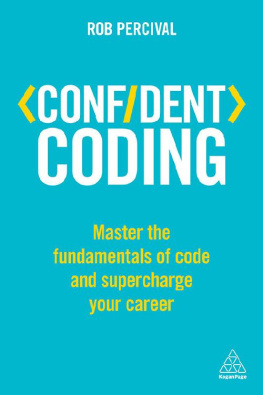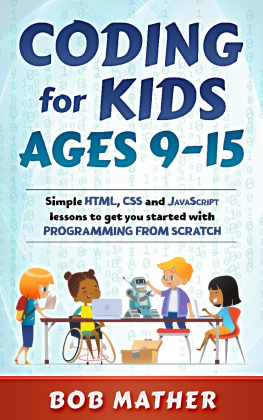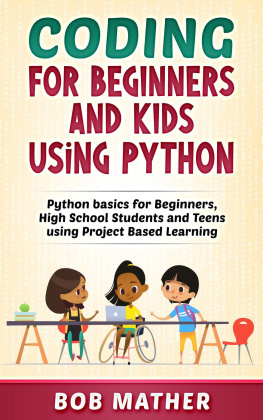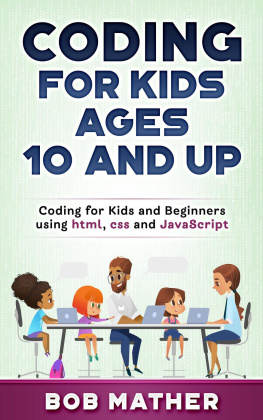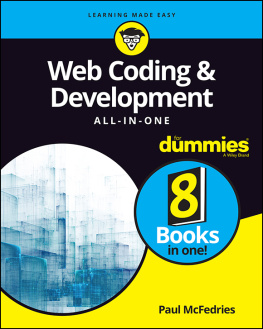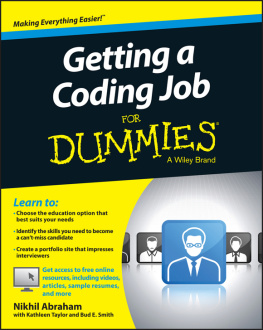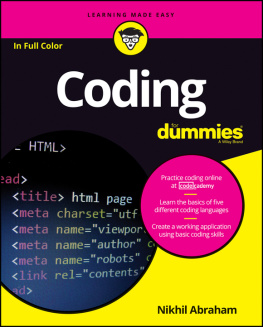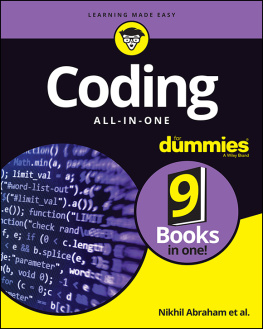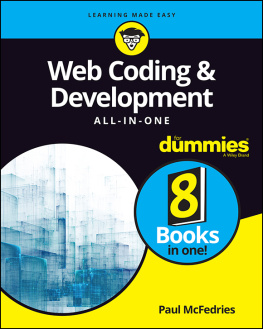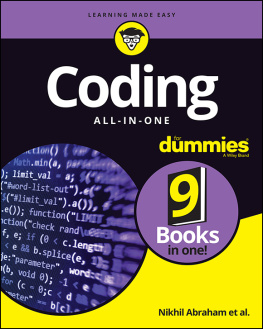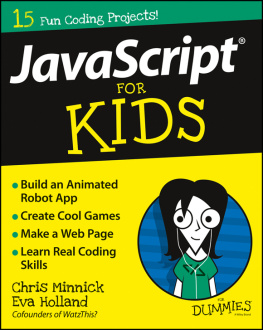Confident Coding
Confident Coding
Master the fundamentals of code and supercharge your career
Rob Percival

Publishers note
Every possible effort has been made to ensure that the information contained in this book is accurate at the time of going to press, and the publishers and author cannot accept responsibility for any errors or omissions, however caused. No responsibility for loss or damage occasioned to any person acting, or refraining from action, as a result of the material in this publication can be accepted by the editor, the publisher or the author.
First published in Great Britain and the United States in 2017 by Kogan Page Limited
Apart from any fair dealing for the purposes of research or private study, or criticism or review, as permitted under the Copyright, Designs and Patents Act 1988, this publication may only be reproduced, stored or transmitted, in any form or by any means, with the prior permission in writing of the publishers, or in the case of reprographic reproduction in accordance with the terms and licences issued by the CLA. Enquiries concerning reproduction outside these terms should be sent to the publishers at the undermentioned addresses:
2nd Floor, 45 Gee Street
London
EC1V 3RS
United Kingdom
c/o Martin P Hill Consulting
122 W 27th Street
New York, NY 10001
USA
4737/23 Ansari Road
Daryaganj
New Delhi 110002
India
Rob Percival 2017
The right of Rob Percival to be identified as the author of this work has been asserted by her in accordance with the Copyright, Designs and Patents Act 1988.
ISBN 978 0 7494 7963 3
E-ISBN 978 0 7494 7988 6
Typeset by Integra Software Services, Pondicherry
Print production managed by Jellyfish
Printed and bound in Great Britain by CPI Group (UK) Ltd, Croydon CR0 4YY
CONTENTS
List of Pages
Guide
In June 2016, Fast Company published an article explaining Why coding is still the most important job skill of the future. The research firm Burning Glass found that jobs requiring coding skills pay, on average, $22,000 more, and that half of all jobs with salaries over $58,000 require some coding skills. Moreover, half of all programming opportunities were in industries outside of technology, including finance, manufacturing and healthcare.
The acquiring of the kinds of specialist skills that could boost salaries and advance careers used to involve at least a degree, if not years of study as part of a PhD or MBA. But today the proliferation of online courses and coding bootcamps has made the acquisition of coding skills highly feasible for anyone with a computer and internet connection.
As computers become smarter, and able to drive cars, write news stories and balance businesses books single-handedly, there will be an ever greater need for people that know how to write the code that commands the machines.
Learning to code also has the extra benefit of not only making a candidate more employable, but also giving them the freedom of starting their own business or creating a side income from making websites and apps.
In this book we will look in detail at both the why and the how of learning to code: after looking at the benefits that programming knowledge brings, we will dive right in learning HTML, the language of all websites. We will then look at a range of other programming languages, and even see how to build native apps for iPhones and Android devices. Finally, we will apply the skills in step-by-step guides to entrepreneurship, building your own websites and apps, increasing your everyday efficiency and even seeing how you might become a full-time software developer.
Even if you have no plans to change careers, we will see how you can use coding skills to make yourself and your colleagues more efficient, creating shortcuts to complete tasks faster, provide quicker feedback and serve your customers and clients better.
My hope for you in reading this book is that you will become fully digitally literate. Some readers may go on to create businesses, some may build apps to help them in their current job, and some might communicate more effectively with the IT guys at the office. But all will have a greater understanding of how coding underpins every interaction we have with our computers, our phones and our smart devices. The lines of code that you write will enable you to better harness the technology that you use every day.
Who am I?
I would like to take a moment to tell you how learning to code has changed my life. I studied Mathematics at university, and went on to become a teacher in a secondary school in London. I very much enjoyed the teaching, but I suspected it might not be what I wanted to do for my whole life, so in the evenings and weekends I started to build websites.
I had done a little coding as a kid, trying to replicate my favourite computer games on a BBC Micro, but I was certainly no Mark Zuckerberg or Bill Gates. I would simply have an idea for a website, and using Google figure out how to put it together. This method of learning was free and fairly effective, but it did mean that I often went down long, unnecessary detours until I discovered that there was a much better way of doing things.
My first website was HomesExchange.org, a site that allowed people to swap homes for a couple of weeks to save accommodation costs. Unfortunately, I hadnt realized that the domain name HomesExchange.org could also be interpreted as HomeSexChange.org. After a few unsavoury support requests, I decided the business was unlikely to go very far!
I built several more sites, most of which came to nothing, until one day I came up with the idea of an eco-friendly web hosting service, to allow people to host their websites and emails in an environmentally friendly way. This was an example of scratching my own itch, as I had looked for such a service myself for my own sites, and the existing options were generally very expensive and didnt have as many features as the big web hosts like GoDaddy and 123-reg.
The service, ecowebhosting.co.uk, turned out to be something that a lot of people wanted, and it started to grow quite naturally, as people discovered the website through Google and word-of-mouth. As the site grew in popularity, I added features and automated processes that I had to do several times a day, learning the coding required as I went.
In 2012 I quit my teaching job in order to focus on Eco Web Hosting and some other projects full time. I quickly discovered that working freelance is not quite as freeing as I thought, as I always had several activities going on at once. I liked having a range of reliable income (through the web hosting), new projects (mostly freelance websites and apps through local contacts) and starting new businesses when I had the latest great idea. But I was also struggling to cope with so many competing calls for my attention.
In January 2014 I started to build an online course to teach people how to build websites. I had noticed that online video courses were becoming popular, and thought that with a combination of my coding knowledge, teaching skills and entrepreneurial experience I might be able to offer a fun, practical and project-based approach to learning to code. That course, The Complete Web Developer Course, went on to be one of the best-selling courses of all time, and I followed it up with The Complete iOS Developer Course, for iPhone apps, and The Complete Android Developer Course, for Android apps.
Next page
